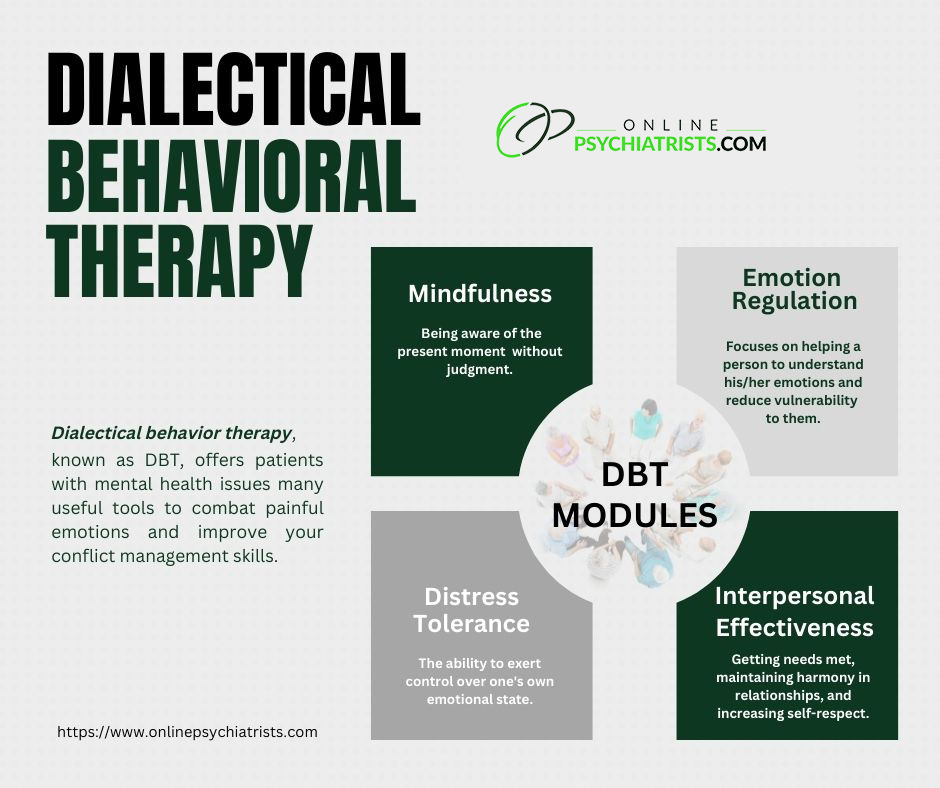

Table of contents
Dialectical behavior therapy (DBT) was created as a complete and empirically-based treatment method for borderline personality disorder, but it also effectively treats an array of other mental health problems. A form of talk therapy, DBT therapy in New York City works in individual sessions or in group sessions. While similar to other cognitive-behavioral approaches, DBT is a specialized method of treating patients. At Online Psychiatrists, your DBT therapist teaches you the wisdom of acceptance through DBT’s four core principles of mindfulness, emotional regulation, distress tolerance and interpersonal effectiveness. Call today to learn more.
★★★★★He treated me as if I was his first and only patient. He listened to me as I explained every detail of my anxiety. This man is someone who went into medicine for precisely the reason we hope all medical professionals join the field — to help people.
Dialectical behavior therapy, known as DBT, offers patients with mental health issues many useful tools to combat painful emotions and improve your conflict management skills. At Online Psychiatrists, you have access to medical therapists trained in DBT. They use this technique in both group settings and individual therapy sessions to target your behavioral problems.
Developed by Marsha Linehan, Ph.D. in the 1980s, this subset of cognitive behavior therapy teaches you useful strategies to temper strong emotions and more effectively handle conflict. The word dialectic refers to the philosophy of balancing opposites. Most people struggling with mental health concerns tend to think in black and white, good and evil and polar opposites.
Available in Florida, New Jersey and New York (NYC), Online Psychiatrists helps adults aged 19 to 65 stay motivated and accountable while acknowledging the progress they’re making. After learning techniques from this talk therapy, you can apply your new Dialectical behavior therapy (DBT) skills in your daily life. What you learn helps you overcome any obstacles that arise during and after treatment.

DBT teaches you simple, practical and daily skills to modulate your mood and behavior. Doing so, it effectively treats several types of mental health problems and mood disorders.
The primary goal of DBT (Dialectical behavior therapy) in NYC is to give you the tools to help you respond to everyday stress with healthy and positive responses. It teaches you practical techniques that apply to several different types of conditions. By participating in DBT, you learn how to:
With DBT, you can develop all the necessary skills to boost your quality of life, mental health, and build stronger interpersonal connections.
Harvard Certified
Nationally Recognized
Book AppointmentDialectical behavioral therapy helps you understand that nearly everyone can hold opposite perspectives at any point in time. During your therapy, you learn methods to accept these opposites in yourself and in others. In day-to-day situations, you begin to foster a “both mentality” that encourages acceptance and then allows you to change and grow. During your therapy, you learn the four core skills of DBT:
Because each person is unique, and mental health conditions are complex, dialectical behavioral therapy requires full commitment to be effective. In general, you should expect to commit to one full year of DBT treatment.
DBT can be more costly than other types of therapy since you typically have to pay for individual treatment sessions, weekly group sessions, and occasional phone calls throughout the week. DBT treatment programs are frequently priced between $150 and $300 per week.
The typical DBT course includes:

Intrapersonal and interpersonal skills usually aren’t taught to people as they grow and mature. Instead, you learn them informally through socializing and family life. Unfortunately, some of the techniques you acquired in the school of hard knocks may have resulted in excessive anger, significant depression or destructive actions towards relationships.
Improving those skills help you:
With dialectical behavior therapy, you can master these basic behavior strategies. Not only does DBT help you regain a sense of control, but you also acquire a better comprehension of your triggers and how to manage them. Contact Online Psychiatrists in NYC, NJ, & FL today and take the first step in controlling your own destiny.
DBT is typically covered by insurance, although coverage may vary depending on the specific plan and provider. It's important to check with your insurance provider to determine what services can be covered and what your out-of-pocket costs may be.
Yes, dialectical behavioral therapy is highly effective in treating intense and unstable emotions, the inability to build healthy relationships, and the impulsivity characteristic of BPD and has been shown to lower the number of suicidal and self-harming cases and improve emotional regulation.
A randomized controlled trial published in the Journal of Consulting and Clinical Psychology has shown that DBT leads to improvements in BPD symptoms, depression, and anxiety. It’s also more effective in reducing suicidal behavior compared to traditional treatments.
Another study published in the AGP found that people who received DBT were less likely to drop out of treatment and had fewer hospitalizations compared to those who received treatment as usual.
Online Psychiatrists are pleased to offer various psychotherapy services and specialties, such as DBT treatment, to everyone in need in the New York City area. We provide teletherapy as well as in-person consultations to suit you and your loved ones. Contact us or call (646) 713-0000 to set up a DBT therapy session.
 Our Locations
Our Locations
The Chrysler Building
405 Lexington Ave, #2601
New York, NY, 10174
Get Directions (Map)
300 Carnegie Center Drive #150K,
Princeton, NJ, 08540
Get Directions (Map)
701 Brickell Avenue, 1550#A,
Miami, FL, 33131
Get Directions (Map)